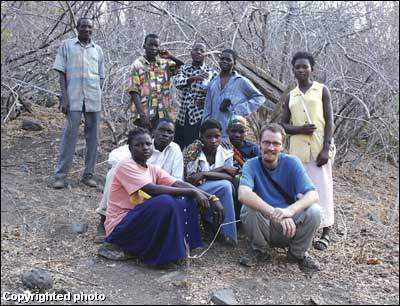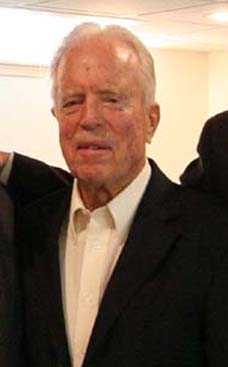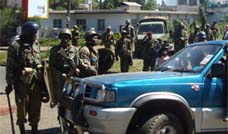
Lawson taught math, science and history, enjoying math the most because numbers are easier to translate. There’s no electricity, so showing a movie to illustrate a concept such as World War II isn’t an option. They don’t have laboratories, so doing experiments in chemistry isn’t feasible. “These are students who have not been 50 miles from their home,” Lawson said. The best teachers knew how to make use of limited resources, he said. They waste nothing, even making soccer balls out of plastic bags.
Ty Lawson served as a Peace Corps Volunteer at Mlare Secondary School in Mlare, Malawi teaching some of the brightest students Malawi had to offer
Transforming education in Malawi
Alexis Terrell, aterrell@vaildaily.com
July 5, 2007
Caption: Peace Corps volunteer Ty Lawson takes a group of students from Mlare Secondary School’s Wildlife Club on an outing to inspect local beekeeping hives in Malawi.
One hundred students sit shoulder to shoulder in 100-degree heat in an unairconditioned classroom with 40 wooden desks, 20 textbooks and one teacher.
Ty Lawson, 32, who now lives in Vail, was that one teacher at Mlare Secondary School in Mlare, Malawi. He spent two years, from 2002-04, in the Peace Corps teaching some of the brightest students Malawi had to offer. But in this country of 13 million people in southeastern Africa, most families are living off less than a dollar a day, struggling to even afford to send their children to school.
The Malawi Ministry of Education has undergone dramatic changes in the past two decades. In 1994, the Malawi government implemented free primary school education nationwide, boosting attendance dramatically from the time when first-grade through eighth-grade education had to be paid for. However, with the switch, secondary school, or high school, became a fee- and testing-based luxury. Limited spots mean not only do students have to test into it, but parents also must pay for their children to receive a secondary school education.
“Most parents do think education is important,” Lawson said of families in Malawi. “But they can only afford to do so much.”
Malawi’s main resource is Lake Malawi, Africa’s third-largest lake. As a result, most families are comprised of either fishermen or farmers. And most students plan on becoming the same. If they are serious about school, they may become school teachers, nurses, policemen or accountants. But the question, “What to you want to be when you grow up?” is one teachers never ask.
The opportunities have increased but are extremely limited. The students are taught in English, usually their third or fourth language, because textbook publishers don’t print lessons in the students’ native tribal languages.
Lawson taught math, science and history, enjoying math the most because numbers are easier to translate. There’s no electricity, so showing a movie to illustrate a concept such as World War II isn’t an option. They don’t have laboratories, so doing experiments in chemistry isn’t feasible.
“These are students who have not been 50 miles from their home,” Lawson said. The best teachers knew how to make use of limited resources, he said. They waste nothing, even making soccer balls out of plastic bags.
The student fees go toward books and other development projects — like bathrooms or water pumps. “It’s just not enough to help,” Lawson said.
The education system has taken many steps toward improvements. In comparison to having one teacher instruct 12 grades by distance radio, as was common in the country 20 years ago, there are more schools and more enthusiasm for education. But all this growth is met by a tremendous teacher shortage. There’s only one teacher training college in Malawi.
Fork in the road
Malawi is at a crossroads. The West is trying to get Malawians to change their views on women in society, who usually marry right after primary school.
“Is it more important for 12- to 14-year-old girls to get an education and possibly make money for their families or get married?” Lawson asked. “We don’t want to tell people what to do. We might be wrong.”
One of the problems that stands in the way is the spread of HIV and AIDS. Nearly 20 percent of the population is HIV positive, resulting in almost 1 million deaths and just as many orphans, according to the CIA World Factbook.
“There are tremendous burdens placed on families to support one another,” Lawson said.
The girls had it especially rough, Lawson said. In addition to attending school, they were still expected to do the washing and cooking. If they went home at lunchtime, it wasn’t to eat — it was to prepare the food so their brothers who were also going to school could eat. The families were big usually that the boys didn’t have to worry about the chores as much.
It’s difficult for families living on a dollar a day to save enough to get ahead, Lawson said. Most families will try to send their kids to secondary school or high school if they can afford it, but it was common to send kids home who hadn’t paid.
“Before when there was a dictator, if you did well in school, you got to move on,” Lawson said. “Now, it’s a democracy, but only the rich can afford it.”









